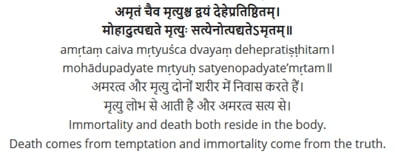Recalling Adi Shakaracharya’s Vedantic Legacy On His Birthday: 09 May 2020

“The mark of a truly civilized man is confidence in the strength and security derived from the inquiring mind,” said Felix Frankfurter, the jurist-philosopher. This belief and dictum has been a cardinal guide in my own personal little quest towards ‘self-evolution’. It has raised many a curious and inquisitive questions, since my young days, that I have asked to myself and am still to reach finality in their answers. The quest continues: “Who am I, where am I going, what is life and its meaning, where did we come from, is there life after death, and is there an explanation to all the woes and troubles?”
Later in life, as I flew daily over the mountains of the Western Ghats in the discharge of my duties, looking down upon the verdant Nature in its full bloom (I remember remarking to my co-flyer with me, “The ethereal mountains look like fingers pointing to the heavenly skies…,” until I was woken up from my distractive sojourn to return to the present, by my condescending co-flyer); I was confronted with a duty of another kind: A quest to inquire into all that we call ‘philosophical longings’, in order to imbibe the finality of one’s existence: “What is Brahman? What is its relationship to Atman? What is the path to attain Moksha?” Thus was laid the trajectory for me to understand the Metaphysical World, bringing me closer to the idea of Advaita (non-duality) and its leading proponent, Adi Shankaracharya.
To roll back the occurrences of history: in the year 788 CE, a boy was born in the quite little village of Kalady on the river Periyar in Kerala (near today’s Cochin) in a pious Nambudiri Brahman family. As he grew up, he heard a different voice and much against the wishes of his mother, left his home when 12 in the quest of a guru to begin his spiritual journey. His search for truth led him to travel the length and breadth of India three times in his spiritual quest. Finally, he walked away to the Himalayas at Kedarnath, renouncing life at the young age of 32; but not before some seminal contribution towards understanding the meaning of life, in the art and science of the Advaita School of thought and practice, that not just repositioned Hinduism but also laid the foundation to today’s significance of Hinduism.

Shankara’s Philosophy and Teachings
Shankara is credited with establishing the Advaita Vedanta School of Hindu Philosophy, anchored in the oldest Upanishads, as undoubtedly the most influential of the multiple schools of philosophy and theology that characterise Hinduism. In his short life, Adi Shankara is not only recognized with reviving a moribund Hinduism, that had lapsed into an era of confusion; but also integrating diverse thoughts and Hindu practices into a philosophy based on the vedic dictum of ‘One Truth, Many Expositions’. He established the organisational structure for its survival and regeneration, through the ‘mathas’ he established in Sringeri, Dwaraka, Puri and Joshimatha. He brought to the masses the life-giving message of the Vedas: “Brahman, Pure Consciousness, is the Absolute Reality. The world is unreal. In essence the individual is not different from Brahman.” Thus by the statement “Brahma Satyam Jagan Mithya, Jeevo Brahmaiva Na Para”, which translates to: “God alone is real. The world is illusory. The individual is none other than God”, he condensed the essence of the voluminous Hindu scriptures.
Shankara’s original work has influenced many a spiritual leaders, past and present, and their own established practicing Schools of Advaita Vedanta; who are continuing the great legacy left behind by Shankara and are doing a yeoman service to the upkeep of the Hindu traditions. Some of them in the forefront are:
Shri Ramana Maharshi of Ramana Ashram, Shri Ramakrishna and Swami Vivekananda of Sri Ramakrishna Mission, Swami Shivananda of the Divine Life Society, Swami Yogananda of Yogada Satsang Society and Swami Chinmayananda of Chinmaya Mission. There are many contemporary thought leaders too, from the varied areas of philosophy, management, polity and society who have been actively influenced by Shankara’s seminal beliefs.
Shankara’s beliefs and teachings are best represented in some of his sayings and writings:

‘Do not be proud of wealth, people, relations and friends, or youth. All these are snatched by time in the blink of an eye. Giving up this illusory world, know and attain the Supreme.”
“Reality can be experienced only with the eye of understanding, not just by a scholar.”
“The world, like a dream full of attachments and aversions seems real until the awakening.”
“As gold purified in a furnace loses its impurities and achieves its own true nature, the mind gets rid of the impurities of the attributes of delusion, attachment and purity through meditation and attains Reality.
“Knowing that I am different from the body, I need not neglect the body. It is a vehicle that I use to transact with the world. It is the temple which houses the Pure Self within.”
“When your last breath arrives, Grammar can do nothing.”
“To be free from bondage the wise person must practice discrimination between One-Self and the ego-self.”
Adi Shankara is considered as the foremost thinker of the Hindu Philosophy, who codified and unified the various disparaging schools of Hindu Thought; helped Hinduism to metamorphose from a mere belief and a way of life (still being subscribed to) to a practicing and vibrant religion, with a scheme of order and establishment.
Some of the major writings of Shankara which can be sourced at the Ramakrisna Mission Matha at Bhubaneswar are: Vivekachudamani, Atmabodha, Tattvabodha, Vaykyavritti, Soundarya-Lahari, Upadeshasahasri, Pancikarana and Laghuvakyaviveka.
The author would like to draw attention of the reader to an erudite, very well-researched and lucid book from his library, Adi Shankaracharya: Hinduism’s Greatest Thinker by Pawan K Varma, recently published by Tranquebar in 2018; to gain more into the life and works of Adi Shankara.
Much as I have been influenced by Adi Shankara’s life and beliefs, when confronted by the many unnerving questions that arise in my mind’s map, I delve into Shankara’s slokas of solace and contentment. Like I often have, I entreat the earnest readers to listen (and follow too) to the mesmerizing and levitating voice of Gabriella Burnel, who studied Sanskrit and the ancient Hindu Philosophical Texts at Oxford and has gone on to became one of the most loved Sanskrit singers in the world; reciting Adi Shankara’s life-transforming chant “Bhaja Govindam”:

Comments are closed.